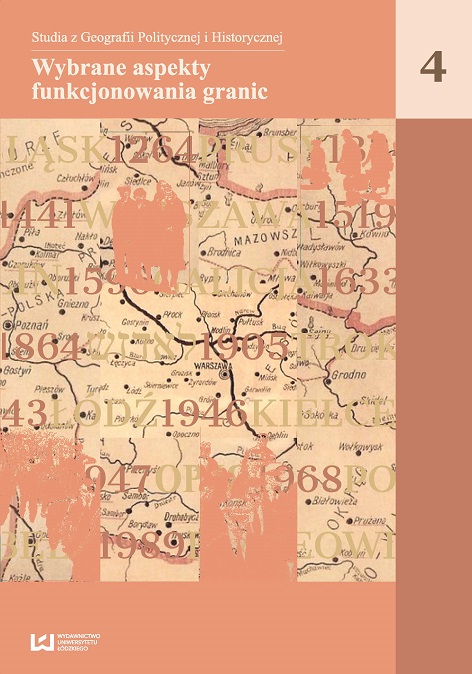The concepts of the Polish state boundaries on the threshold of independence
DOI:
https://doi.org/10.18778/2300-0562.04.01Keywords:
Polish territory, Polish borders, concepts of Polish bordersAbstract
After the Polish-Lithuanian Commonwealth was liquidated and disappeared from the map of Europe at the end of the 18th century, and was partitioned by Russia, Prussia, and Austria, Polish activists of the independence movements never consented to the fact and continued to work for the revival of the Polish state. One of the issues pondered about was that of the future boundaries of this state. Initially, the issue was not complicated at all, since it was commonly held that the sole just solution would be the return to the historical boundaries of 1772. In the later period, the awareness arose that this option cannot be realised. This was not only the consequence of the stable and disadvantageous for Poland geopolitical situation in Europe, but also of the ethnic diversification of the territory of the former Commonwealth. That is why various concepts started to appear, concerning the future boundaries of Poland, considering the historical, geopolitical, strategic, and ethnic conditioning. These concepts were primarily the visions of individual scholars or activists, but often they did represent definite ideological and political orientations. The article presents and comments upon some of these designs. Those more original in substantive terms, and containing an interesting cartographic illustration, were selected for presentation.
References
Dmowski R., 2014, Polityka polska i odbudowanie państwa, [w:] Wybór pism, t. 1, Poznań, s. 141–754.
Google Scholar
Eberhardt P., 1999, Zasięg terytorialny Polski w koncepcjach badaczy polskich (1864– 1921), „Przegląd Geograficzny”, 71 (1–2), s. 3–25.
Google Scholar
Eberhardt P., 2004, Polska i jej granice. Z historii polskiej geografii politycznej, Lublin.
Google Scholar
Jankowski C., 1914, Polska etnograficzna, Warszawa.
Google Scholar
Janowski A., 1913, Ziemia rodzinna, Warszawa.
Google Scholar
Jaskólski J., 1919, Granice Polski, Lwów.
Google Scholar
Kawalec K., 1996, Roman Dmowski, Warszawa.
Google Scholar
Kozicki S., 1921, Sprawa granic Polski na konferencji pokojowej w Paryżu 1919 r., Warszawa.
Google Scholar
Kulak T., 1994, Jan Ludwik Popławski. Biografia polityczna, Wrocław–Warszawa–Kraków.
Google Scholar
Leczyk M., 1966, Komitet Narodowy Polski a ententa i Stany Zjednoczone, Warszawa.
Google Scholar
Pajewski J., 1970, Wokół sprawy polskiej. Paryż – Lozanna – Londyn 1914–1918, Poznań.
Google Scholar
Pobóg-Malinowski W., 1953, Najnowsza historia polityczna Polski, t. 2, Londyn.
Google Scholar
Romer E., 1989, Pamiętnik paryski 1918–1919, Wrocław–Warszawa–Kraków–Gdańsk.
Google Scholar
Romer E., 1912, Przyrodzone podstawy Polski historycznej, Lwów.
Google Scholar
Skarga-Dobrowolski W., 1918, Mapa zjednoczonej Polski, Lublin.
Google Scholar
Sykulski L., 2010, Oskar Żebrowski – prekursor geopolityki polskiej, „Przegląd Geopolityczny”, 2, s. 169–174.
Google Scholar
Wakar W., 1917, Program terytorialny, „Polska. Pismo poświęcone zagadnieniom ideologii patriotycznej”, 2, s. 6–16; 4, s. 14–16; 5, s. 15–16.
Google Scholar
Wakar W., 1917–1918, Rozwój terytorialny narodowości polskiej, t. 1–3, Warszawa–Kielce.
Google Scholar
Wapiński R., 1994, Polska i małe ojczyzny Polaków, Wrocław–Warszawa–Kraków.
Google Scholar
Wysłouch B., 1886, Szkice programowe, „Przegląd Społeczny”, 6, s. 395–493.
Google Scholar
Zamoyski J., 1984, Powrót Polski na mapę Europy. Polski Komitet Narodowy w Paryżu 1914–1919, Londyn.
Google Scholar
Żebrowski O., 1847, Ogólny zarys przyczyn wzrostu i upadku dawnego państwa polskiego, Paryż.
Google Scholar
Downloads
Published
How to Cite
Issue
Section
License

This work is licensed under a Creative Commons Attribution-NonCommercial-NoDerivatives 4.0 International License.








